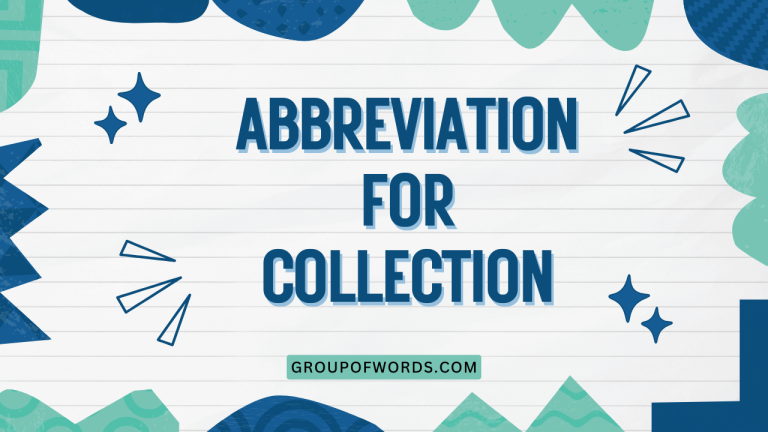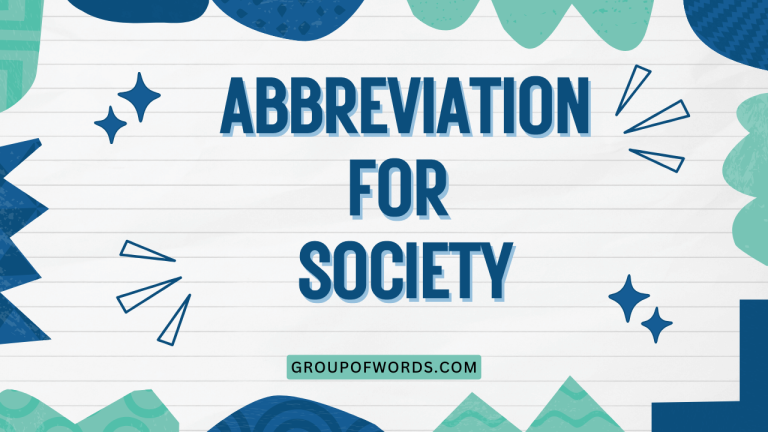Understanding Abbreviations for “Retired”: A Comprehensive Guide
Abbreviations are a common feature of the English language, used to shorten words and phrases for convenience and clarity. When discussing someone’s professional status, particularly retirement, several abbreviations come into play.
This comprehensive guide will explore the various abbreviations used for “retired,” their specific contexts, proper usage, and potential pitfalls. Whether you’re a student, writer, or simply seeking to improve your understanding of English grammar, this article will provide you with the knowledge and tools necessary to use these abbreviations accurately and confidently.
Mastering the abbreviations for “retired” not only enhances your writing and communication but also ensures that you convey the intended meaning without ambiguity. This article will cover everything from the basic definitions to advanced usage scenarios, equipping you with a thorough understanding of this essential aspect of English grammar.
Table of Contents
- Introduction
- Definition of “Retired” and its Abbreviations
- Structural Breakdown of Abbreviations
- Types and Categories of Abbreviations for “Retired”
- Examples of Abbreviations in Use
- Usage Rules for Abbreviations
- Common Mistakes to Avoid
- Practice Exercises
- Advanced Topics: Contextual Usage
- Frequently Asked Questions
- Conclusion
Definition of “Retired” and its Abbreviations
The term “retired” refers to the state of having permanently stopped working in a particular profession or occupation, typically after reaching a certain age or fulfilling specific requirements. This transition often marks the end of one’s active career and the beginning of a new phase of life.
The word “retired” itself is an adjective describing someone who has undergone this transition.
Several abbreviations are commonly used to represent “retired,” each with its own nuances and contexts. Understanding these abbreviations is crucial for clear and concise communication.
The most common abbreviations include:
- Ret.: A general abbreviation for “retired.”
- Ret’d: Another common abbreviation, also meaning “retired.”
- Rtd.: A less common, but still valid, abbreviation for “retired.”
These abbreviations are primarily used in formal writing, professional contexts, and records where space is limited or brevity is desired. They serve the same function – indicating that an individual is no longer actively employed in their previous role.
Structural Breakdown of Abbreviations
The structure of abbreviations for “retired” is relatively straightforward. They are derived from the full word “retired” by shortening it, typically removing vowels or trailing letters.
The use of a period (.) after the abbreviation is a standard convention, indicating that the word has been shortened. Let’s break down the structural elements:
- Ret.: This is the most common form. It takes the first three letters of “retired” and adds a period.
- Ret’d: This form uses an apostrophe to indicate missing letters and also includes the ‘d’ from the end of “retired.”
- Rtd.: This version takes the first two letters, combined with the last letter of the word.
The purpose of these structures is to provide a recognizable shorthand for “retired” while maintaining clarity. The period is essential for distinguishing the abbreviation from a complete word.
Types and Categories of Abbreviations for “Retired”
While the core meaning remains the same, the choice of abbreviation can depend on the specific context and style guidelines. Here’s a breakdown of the types and categories:
General Abbreviations
These are the most widely used and accepted abbreviations for “retired.”
- Ret.
- Ret’d
Less Common Abbreviations
These abbreviations are less frequently encountered but still valid.
- Rtd.
Context-Specific Abbreviations
In certain specialized fields or organizations, specific abbreviations may be used internally. These are less standardized and depend on the particular context.
It’s important to note that the choice between these abbreviations often comes down to personal preference or the style guide being followed. However, “Ret.” is generally considered the most universally accepted and recognized form.
Examples of Abbreviations in Use
To illustrate the usage of these abbreviations, let’s examine several examples in different contexts. These examples will demonstrate how “Ret.,” “Ret’d,” and “Rtd.” are used in sentences, lists, and professional settings.
Examples with “Ret.”
The abbreviation “Ret.” is commonly used in formal documents, lists, and professional communications. It is a versatile and widely recognized abbreviation.
Here’s a table showcasing the usage of “Ret.” in various contexts:
| Sentence | Context |
|---|---|
| John Smith, Ret., attended the ceremony. | Formal announcement |
| Dr. Emily Carter (Ret.) published her memoirs. | Professional achievement |
| Ret. General Thompson gave a speech. | Military context |
| List of Attendees: Jane Doe, Ret.; Richard Roe, Active. | List of personnel |
| The Ret. officers meet monthly. | Group affiliation |
| Mr. Anderson, Ret., is now a consultant. | Career transition |
| Ret. employees are eligible for benefits. | HR policy |
| The book was dedicated to Ret. Sergeant Major Davis. | Book dedication |
| Ret. Judge Miller presided over the case. | Legal context |
| Contact: Ret. Professor Williams. | Professional contact |
| Ret. Nurse Johnson volunteered at the clinic. | Volunteer work |
| The organization honored Ret. Firefighter O’Malley. | Public recognition |
| Ret. Principal Edwards visited the school. | Educational setting |
| The scholarship was established by Ret. Engineer Patel. | Philanthropy |
| Ret. Chef Garcia opened a cooking school. | New career venture |
| Ret. Detective Brown solved his last case. | Crime fiction |
| The community welcomed Ret. Ambassador Lee. | Diplomatic service |
| Ret. CEO Roberts became a mentor. | Business mentorship |
| The garden was dedicated to Ret. Gardener Green. | Memorial tribute |
| Ret. Musician Evans played at the festival. | Artistic pursuit |
| Ret. Accountant White offered tax advice. | Financial consulting |
| The award was presented by Ret. Athlete Taylor. | Sports recognition |
| Ret. Librarian King donated books to the library. | Community service |
| The project was led by Ret. Architect Clark. | Design collaboration |
| Ret. Pilot Wright flew his last mission. | Aviation history |
Examples with “Ret’d”
The abbreviation “Ret’d” is also widely accepted and used in similar contexts as “Ret.” The inclusion of the apostrophe and ‘d’ can sometimes give it a slightly more informal feel, though it’s still suitable for formal use.
Here’s a table illustrating the use of “Ret’d” in different situations:
| Sentence | Context |
|---|---|
| Susan Jones, Ret’d, is enjoying her free time. | Personal update |
| The Ret’d faculty members were invited to the reunion. | Educational event |
| Ret’d Captain Miller shared his war stories. | Military narrative |
| List of Staff: David Lee, Active; Mary Kim, Ret’d. | Employee listing |
| The Ret’d teachers formed a support group. | Social group |
| Mr. Davis, Ret’d, is a seasoned traveler. | Personal interest |
| Ret’d employees receive a pension. | Employee benefits |
| The film featured Ret’d Officer Garcia. | Documentary film |
| Ret’d Senator Brown wrote a book. | Political commentary |
| Contact Ret’d Engineer Smith for details. | Professional contact |
| Ret’d Doctor Wilson volunteered her services. | Medical assistance |
| The city honored Ret’d Policeman Johnson. | Public service |
| Ret’d Professor Davis gave a lecture. | Academic presentation |
| A scholarship was created by Ret’d Lawyer King. | Legal scholarship |
| Ret’d Baker Garcia opened a café. | Culinary venture |
| Ret’d Investigator Miller solved the mystery. | Detective novel |
| The country welcomed Ret’d Diplomat Jones. | Diplomatic return |
| Ret’d Executive Wilson mentored young entrepreneurs. | Business mentoring |
| The park was named after Ret’d Gardener Brown. | Public dedication |
| Ret’d Artist Davis exhibited his paintings. | Art exhibition |
| Ret’d Accountant Green offered financial advice. | Financial planning |
| The award was presented by Ret’d Athlete Smith. | Sports award |
| Ret’d Librarian Wilson donated her collection. | Library donation |
| The design was led by Ret’d Architect Jones. | Architectural project |
| Ret’d Pilot Brown shared his experiences. | Aviation history |
Examples with “Rtd.”
The abbreviation “Rtd.” is less common than “Ret.” or “Ret’d,” but it is still a valid option. It may be preferred in certain contexts or by individuals who find it more aesthetically pleasing.
Here’s a table providing examples of “Rtd.” in use:
| Sentence | Context |
|---|---|
| Michael Brown, Rtd., enjoys playing golf. | Personal hobby |
| The Rtd. faculty members meet for lunch. | Social gathering |
| Rtd. Sergeant Johnson recounted his military service. | Military reminiscence |
| Staff List: Alice Green, Active; Peter Gray, Rtd. | Employee roster |
| The Rtd. professionals offer mentorship. | Mentorship program |
| Ms. Evans, Rtd., is a world traveler. | Travel experience |
| Rtd. employees are eligible for healthcare. | Health benefits |
| The documentary featured Rtd. Officer Smith. | True crime documentary |
| Rtd. Governor Miller published his memoirs. | Political biography |
| Contact Rtd. Designer Davis for consultation. | Design consultation |
| Rtd. Nurse White volunteered at the hospital. | Medical volunteering |
| The town honored Rtd. Officer Green. | Public recognition |
| Rtd. Professor Brown gave a seminar. | Academic seminar |
| The fund was established by Rtd. Attorney Evans. | Legal foundation |
| Rtd. Chef Smith opened a restaurant. | Culinary business |
| Rtd. Investigator Davis solved the case. | Mystery solving |
| The nation welcomed Rtd. Ambassador White. | Diplomatic return |
| Rtd. Manager Green mentored employees. | Business mentorship |
| The garden was dedicated to Rtd. Gardener Smith. | Garden dedication |
| Rtd. Singer Brown performed at the concert. | Musical performance |
| Rtd. Accountant Davis offered tax advice. | Financial consultation |
| The award was presented by Rtd. Athlete White. | Sports award |
| Rtd. Librarian Green donated books to the school. | Educational donation |
| The design was conceived by Rtd. Architect Smith. | Architectural design |
| Rtd. Pilot Davis shared his flying stories. | Aviation stories |
Usage Rules for Abbreviations
Using abbreviations correctly is essential for maintaining clarity and professionalism in writing. Here are some key rules to follow when using abbreviations for “retired”:
- Capitalization: Capitalize the abbreviation when it appears at the beginning of a sentence or when referring to a proper noun (e.g., “Ret. General Smith”).
- Punctuation: Always include a period after the abbreviation to indicate that it is a shortened form of the word.
- Consistency: Choose one abbreviation (e.g., “Ret.”) and use it consistently throughout your document or communication.
- Context: Consider your audience and the context of your writing. In formal documents, using “Ret.” or “Ret’d” is generally preferred. In informal settings, you might spell out the word “retired” instead of using an abbreviation.
- Clarity: Ensure that the abbreviation is easily understood. If there is a risk of confusion, it is better to spell out the word “retired.”
Following these usage rules will help you use abbreviations for “retired” accurately and effectively.
Common Mistakes to Avoid
Even with a clear understanding of the rules, it’s easy to make mistakes when using abbreviations. Here are some common errors to avoid:
| Incorrect | Correct | Explanation |
|---|---|---|
| Ret General Smith | Ret. General Smith | Missing period after the abbreviation. |
| ret. John Doe | Ret. John Doe | Incorrect capitalization. |
| Ret’d. Jane Doe | Ret’d Jane Doe | Extra period after the apostrophe. |
| Rtd Smith | Rtd. Smith | Missing period after the abbreviation. |
| Retired General Smith, Ret. | Ret. General Smith | Redundant use of both the full word and the abbreviation. |
| The ret teacher | The Ret. teacher | Missing period and incorrect capitalization. |
| Ret’d officer | Ret’d officer | Incorrect apostrophe (use ‘). |
| Rtd. Senator (rtd) | Rtd. Senator | Unnecessary repetition of status. |
| Ret. Senator, who retired | Ret. Senator | Redundant explanation of retirement status. |
| Ret-d professor | Ret’d professor | Incorrect use of hyphen instead of apostrophe. |
Avoiding these common mistakes will improve the clarity and accuracy of your writing.
Practice Exercises
To reinforce your understanding, complete the following practice exercises. Fill in the blanks with the correct abbreviation for “retired” (“Ret.,” “Ret’d,” or “Rtd.”).
Exercise 1
Choose the correct abbreviation (Ret., Ret’d, or Rtd.) to complete the following sentences.
| Question | Answer |
|---|---|
| 1. ____ Dr. Johnson volunteered at the clinic. | Ret. / Ret’d / Rtd. Dr. Johnson volunteered at the clinic. |
| 2. The ceremony honored ____ Officer Miller. | The ceremony honored Ret. / Ret’d / Rtd. Officer Miller. |
| 3. A donation was made by ____ Professor Davis. | A donation was made by Ret. / Ret’d / Rtd. Professor Davis. |
| 4. ____ Judge Thompson presided over the court. | Ret. / Ret’d / Rtd. Judge Thompson presided over the court. |
| 5. Contact ____ Engineer Smith for details. | Contact Ret. / Ret’d / Rtd. Engineer Smith for details. |
| 6. The book was dedicated to ____ General Clark. | The book was dedicated to Ret. / Ret’d / Rtd. General Clark. |
| 7. ____ CEO Wilson became a consultant. | Ret. / Ret’d / Rtd. CEO Wilson became a consultant. |
| 8. ____ Nurse Evans shared her experiences. | Ret. / Ret’d / Rtd. Nurse Evans shared her experiences. |
| 9. The award was given by ____ Athlete Green. | The award was given by Ret. / Ret’d / Rtd. Athlete Green. |
| 10. ____ Librarian Brown donated books. | Ret. / Ret’d / Rtd. Librarian Brown donated books. |
Exercise 2
Rewrite the following sentences using the abbreviation “Ret.,” “Ret’d,” or “Rtd.” where appropriate.
| Question | Answer |
|---|---|
| 1. Retired teacher Jane Doe visited the school. | Ret. / Ret’d / Rtd. teacher Jane Doe visited the school. |
| 2. The retired officers held a reunion. | The Ret. / Ret’d / Rtd. officers held a reunion. |
| 3. John Smith, who is retired, enjoys gardening. | John Smith, Ret. / Ret’d / Rtd., enjoys gardening. |
| 4. The retired employee received a pension. | The Ret. / Ret’d / Rtd. employee received a pension. |
| 5. Contact the retired professor for more information. | Contact the Ret. / Ret’d / Rtd. professor for more information. |
| 6. Retired detective Miller solved the case. | Ret. / Ret’d / Rtd. detective Miller solved the case. |
| 7. The retired diplomat returned home. | The Ret. / Ret’d / Rtd. diplomat returned home. |
| 8. Retired manager Green mentored the team. | Ret. / Ret’d / Rtd. manager Green mentored the team. |
| 9. The retired singer performed at the concert. | The Ret. / Ret’d / Rtd. singer performed at the concert. |
| 10. Retired pilot Brown shared his stories. | Ret. / Ret’d / Rtd. pilot Brown shared his stories. |
Advanced Topics: Contextual Usage
In advanced usage, understanding the nuances and subtleties of contextual application becomes crucial. While “Ret.,” “Ret’d,” and “Rtd.” are generally interchangeable, certain contexts may favor one over another.
For example, in highly formal or official documents, “Ret.” might be preferred due to its simplicity and widespread recognition. In more conversational or slightly informal settings, “Ret’d” might be used.
Furthermore, the choice can depend on the specific organization or industry. Some organizations may have internal style guides that dictate the preferred abbreviation.
It’s always a good practice to consult these guidelines when available.
Another advanced topic is the use of abbreviations in conjunction with other titles or qualifications. For instance, someone might be referred to as “Dr.
John Smith, Ret.,” indicating both their professional title and their retirement status. The order and placement of these abbreviations are important for clarity and correctness.
Frequently Asked Questions
Here are some frequently asked questions about abbreviations for “retired”:
- Is it necessary to use a period after the abbreviation?
Yes, it is generally necessary to use a period after the abbreviation (“Ret.,” “Ret’d,” “Rtd.”) to indicate that it is a shortened form of the word. This is a standard convention in English grammar.
- Which abbreviation is the most common?
“Ret.” is generally considered the most common and widely accepted abbreviation for “retired.” It is versatile and easily recognized in various contexts.
- Can I use these abbreviations in formal writing?
Yes, you can use these abbreviations in formal writing, especially when space is limited or brevity is desired. However, ensure that the context is appropriate and that the abbreviation is easily understood.
- Is “Ret’d” more informal than “Ret.”?
While both are acceptable in formal contexts, “Ret’d” can sometimes be perceived as slightly more informal due to the inclusion of the apostrophe and ‘d’. However, the difference is subtle.
- Should I capitalize the abbreviation?
Yes, capitalize the abbreviation when it appears at the beginning of a sentence or when referring to a proper noun (e.g., “Ret. General Smith”).
- What if I don’t know which abbreviation to use?
When in doubt, spell out the word “retired.” This ensures clarity and avoids any potential confusion or misinterpretation.
- Are there any style guides that specify which abbreviation to use?
Yes, some organizations and industries have style guides that dictate the preferred abbreviation. Consult these guidelines when available to ensure consistency and accuracy.
- Can I use these abbreviations in informal conversation?
While technically correct, using these abbreviations in informal conversation might sound overly formal. In such settings, it’s generally more natural to simply say that someone is “retired.”
Conclusion
Understanding the abbreviations for “retired” (“Ret.,” “Ret’d,” “Rtd.”) is an essential aspect of English grammar. Knowing when and how to use these abbreviations correctly can significantly enhance your writing and communication skills.
By following the rules and guidelines outlined in this article, you can confidently use these abbreviations in various contexts, from formal documents to informal communications.
Remember to choose the abbreviation that best suits the context, maintain consistency throughout your writing, and always prioritize clarity. With practice and attention to detail, you can master the use of these abbreviations and improve the overall quality of your written and spoken English.






